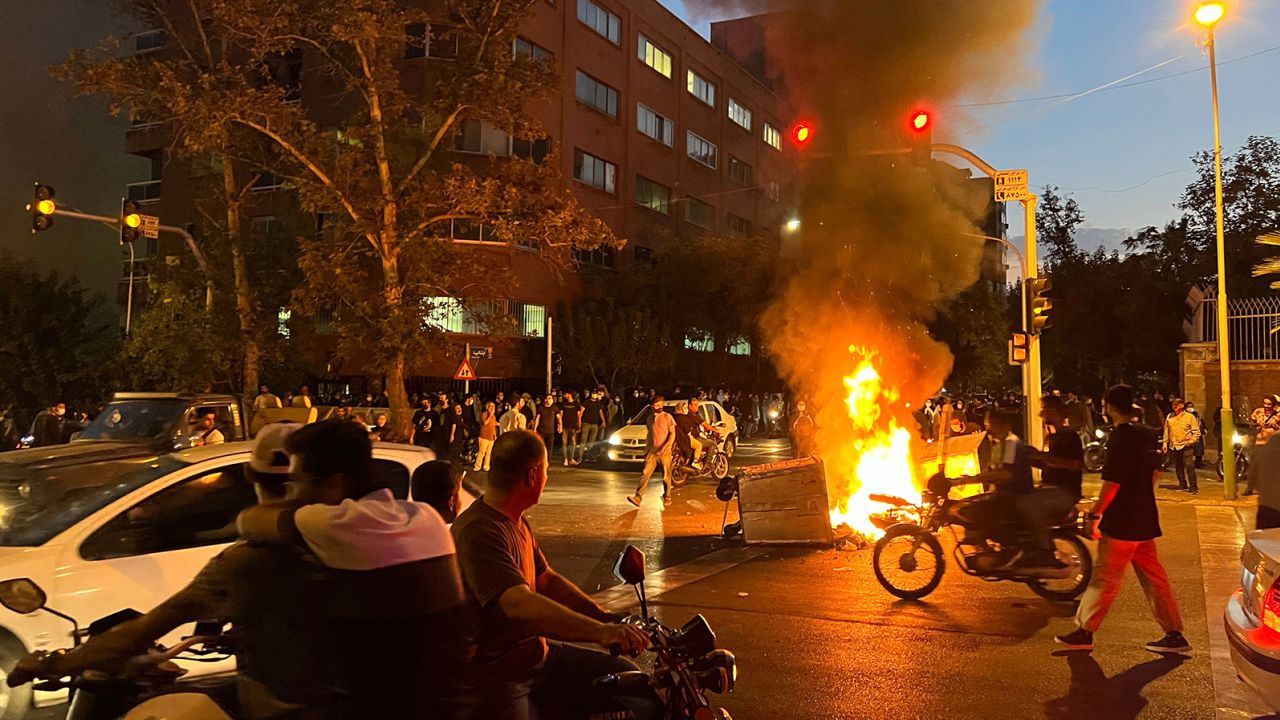Five people have reportedly been killed in protests across Iran, which erupted after Mahsa Amini died in police custody after being arrested for violating hijab rules.
Demonstrations were held in several Iranian cities, mainly in Kurdistan Province after the death of Amini who was arrested by Iran's morality police on September 13 due to her "improper appearance", which was said to contradict Sharia rules. She later supposedly fell into a coma and died in a Tehran hospital on September 16.
Five people were reportedly killed and over 100 were wounded in Kurdistan Province on September 16 after security forces opened fire on protestors, according to the Hengaw Human Rights Organization.
Protests also took place at universities in Tehran and Isfahan, as well as many other campuses in the capital. Students at Tehran University organised a protest on September 18 chanting "woman, life, freedom". Some female students of Shahid Beheshti University called for the end of clerical rule and removed their headscarves in protest of mandatory hijab laws.
Meanwhile, the Fars news agency, affiliated with the Islamic Revolution Guard Corps (IRGC), mentioned in its coverage that there were fewer than 300 protestors, some of whom burned public litter bins and threw rocks at police vehicles. "The riot police dispersed the protesters using batons and tear gas," it added.
Amid growing public anger, Iran’s President Ebrahim Raisi expressed his condolences to the Amini family in a phone call on September 18. "I have directed officials to closely investigate the issue so that no right is violated," Raisi said, adding that "your daughter and all Iranian girls are my children and I do feel like I have lost a loved one".
According to Jalil Rahimi Jahanabadi, a member of the parliament's National Security and Foreign Policy Committee, a bill aimed at restricting police authority in its dealings with members of the public was being processed.
Despite growing criticism, the Iranian police deny any misconduct. According to the Tehran police chief, any accusation about Amini’s death “is an absolute lie," as she suffered “sudden heart failure”. On September 20, the UN Human Rights Office said Iran's morality police have expanded their patrols in recent months, targeting women for not properly wearing the Islamic headscarf, known as hijab. It said verified videos show women being slapped in the face, struck with batons and thrown into police vans for wearing the hijab too loosely.
"Mahsa Amini’s tragic death and allegations of torture and ill-treatment must be promptly, impartially and effectively investigated by an independent competent authority," Nada Al-Nashif, the acting UN high commissioner for human rights said.
The hijab has been compulsory for women in Iran since the 1979 Islamic Revolution and the morality police are charged with enforcing this and other restrictions. Established in 2005, the morality police work closely with the judiciary and the Basij, a hard-line paramilitary unit affiliated with the IRGC.
Since Ebrahim Raisi took office last year, Iran has tightened its dress code rules.
The government crackdown sparked a protest movement over the summer by Iranian women, who photographed themselves without headscarves and posted the pictures on social media.
Amnesty International documented at least 92 deaths in custody resulting from "deliberate" denial of lifesaving medical care to Iranian prisoners from 2010 to 2021. In February 2018, Iranian police announced that 29 women who removed their headscarves in public as a sign of protest against the law requiring women to veil in public had been arrested.
In December 2017, an Iranian police chief announced that the country will no longer detain women who violate the Islamic dress code.
Former moderate President Hassan Rouhani has pressed for relaxing some of Iran’s morality-related laws, which has irked hardliners that tend to dominate Iran’s security forces and the judiciary.







 Azerbaijan and Armenia started the process of demarcation of their border on Tuesday, with the installation of the first border markers based on ge...
Azerbaijan and Armenia started the process of demarcation of their border on Tuesday, with the installation of the first border markers based on ge...
 President Aliyev emphasized the critical role of the North-South Transport Corridor in fostering transport cooperation between Azerbaijan and Russi...
President Aliyev emphasized the critical role of the North-South Transport Corridor in fostering transport cooperation between Azerbaijan and Russi...
 Armenian sappers commenced on Monday mine-clearance operations in the territories adjacent to the Saint Mary Church in village of Voskepar (Armenia...
Armenian sappers commenced on Monday mine-clearance operations in the territories adjacent to the Saint Mary Church in village of Voskepar (Armenia...
 Russian Foreign Minister Sergei Lavrov has reasserted that Moscow has no intentions to stop the fighting in Ukraine, even if peace talks commence.
Russian Foreign Minister Sergei Lavrov has reasserted that Moscow has no intentions to stop the fighting in Ukraine, even if peace talks commence.



